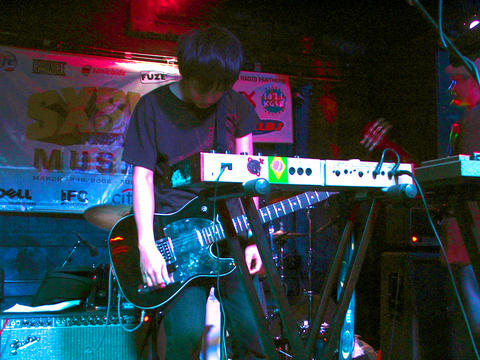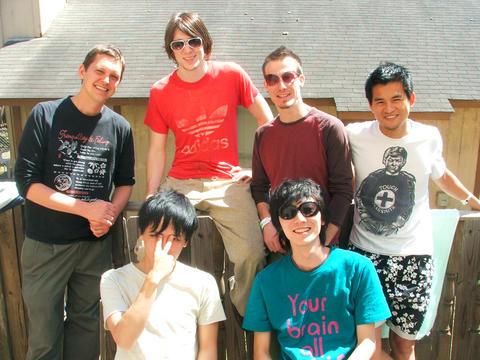When Cheer Hsieh (謝青翰) and Chet Liu (劉鎮) formed KbN (凱比鳥) in the late 1990s, they were just another group of guys with another punk band. Now, 10 years, several lineup changes and a major musical redirection later, the group made history when they played Saturday night at the Elysium club in Austin, Texas, becoming the first Taiwanese act ever to play South by Southwest .
"It was awesome to watch your own people playing on the stage so aggressively," said Ho Tai, a Taiwan-born US resident who drove down from Dallas and waved a Taiwanese flag on the packed dance floor during the band's performance. "I felt like I was one of them," he said. "I felt like I was playing on the stage."
Simply getting invited to SXSW, now regarded as the world's foremost rock festival, is a major honor for a young band like KbN. Only one-tenth of the 8,000 bands that applied were accepted to play at the five-day fest this year.

PHOTO: RON BROWNLOW, TAIPEI TIMES
But KbN's participation has added significance because the band is paving the way for other Taiwanese artists to play here in the future. A survey conducted by Austin Co-op Radio found the station's listeners want to hear more independent music from Asia. And SXSW organizers are keen on putting together a Taiwanese showcase next year.
"They're basically starting this connection that will turn into something that's much bigger than themselves," said Nathan Davis, a Taipei-based musician who plays with KbN and organized their trip to Austin. "It's much bigger than just one band coming to play a show at South by Southwest."
KbN was founded by Hsieh, now 25, and Liu, 26, when the two were classmates at the Affiliated Senior High School of National Taiwan Normal University (師大附中).

PHOTO: RON BROWNLOW, TAIPEI TIMES
After Bobo Chen (陳映霖) joined the group and dabbling in psychedelic folk, they became an experimental electronica group with the addition of Jerry Fang (方宜正), now 26, and his drum machine in 2000.
The band has survived the departure of several key members, including Liu, and has played at all of Taiwan's major rock festivals. Its music has appeared on compilation albums released by the Ho-Hai-Yan music festival and Taiwanese indie labels White Wabbit Records and Silent Agreement.
Two years ago, KbN's song Urge (衝動) earned a Golden Horse Award nomination for best original film song for the Hou Hsiao-hsien (侯孝賢) film Three Times (最好的時光).
But their visit to SXSW was only their second trip abroad and their first to a major festival. They played at Elysium on Saturday as part of Japan night, a popular SXSW fixture that tours the US after the festival ends.
"We are going to try to make some connections to bring some other bands from Taiwan next year," Hsieh said on the sidelines of a rehearsal on Wednesday. "I think a lot of Taiwanese bands are way better than us, but we were just lucky to get the chance to come here."
KbN was one of five Taiwanese bands scheduled to play at SXSW this year as part of a planned Taiwanese showcase. The other four bands backed out when it became clear they would not receive financial backing from the government or local cultural organizations. KbN organized several benefit concerts to pay for their expenses and received discounted tickets from United Airlines.
Chen and Hsieh traveled to the US with Davis - Fang's US visa application was rejected - and played shows in San Antonio and at an unofficial South by Southwest showcase, where they were filmed by a local TV station whose reporter introduced them on camera as "the first Taiwanese group to be and perform at South by Southwest."
Taiwanese musician Remi Huang (黃宏駿), 29, who traveled with KbN as a soundman, said the group was ideal for the role.
"Most of the bands in Taiwan really want to say something, but most of the time the things they want to say aren't very interesting. Or they care too much about a particular style of music" he said. "KbN focuses on their music. And they look good, too."
That was certainly the case on Saturday night, when Chen and Hsieh looked comfortable on stage as they layered synthesizer noise and an electric guitar through a keyboard over spare drum 'n' bass-influenced beats. The result sounded unique and avant-garde, but had enough hooks to keep the audience bopping and swaying. At the end of their set, they were joined by Davis on drums, bass player Joe Moody, keyboardist Jimmy Brettell and guitarist Brandon Cobb, for a fuller, funkier sound.
"They didn't seem typical - that's the best way of putting it," said Lee Fraser, who was at the Elysium on Saturday and heard KbN's performance.
Sitting on the club's terrace after the show, as fans approached him to compliment him on his performance, Chen said he was surprised by the enthusiasm and large size of the audience.
Hsieh said he will encourage other underground Taiwanese bands to do their best to participate in SXSW next year.
"We should all come together," he said. "If we have a Taiwan night it would be really fun."
For your information:
To listen to KbN's music and find out more about the band, visit www.myspace.com/funkbnice or funkbnice.podomatic.com.

April 14 to April 20 In March 1947, Sising Katadrepan urged the government to drop the “high mountain people” (高山族) designation for Indigenous Taiwanese and refer to them as “Taiwan people” (台灣族). He considered the term derogatory, arguing that it made them sound like animals. The Taiwan Provincial Government agreed to stop using the term, stating that Indigenous Taiwanese suffered all sorts of discrimination and oppression under the Japanese and were forced to live in the mountains as outsiders to society. Now, under the new regime, they would be seen as equals, thus they should be henceforth

Last week, the the National Immigration Agency (NIA) told the legislature that more than 10,000 naturalized Taiwanese citizens from the People’s Republic of China (PRC) risked having their citizenship revoked if they failed to provide proof that they had renounced their Chinese household registration within the next three months. Renunciation is required under the Act Governing Relations Between the People of the Taiwan Area and the Mainland Area (臺灣地區與大陸地區人民關係條例), as amended in 2004, though it was only a legal requirement after 2000. Prior to that, it had been only an administrative requirement since the Nationality Act (國籍法) was established in

With over 80 works on display, this is Louise Bourgeois’ first solo show in Taiwan. Visitors are invited to traverse her world of love and hate, vengeance and acceptance, trauma and reconciliation. Dominating the entrance, the nine-foot-tall Crouching Spider (2003) greets visitors. The creature looms behind the glass facade, symbolic protector and gatekeeper to the intimate journey ahead. Bourgeois, best known for her giant spider sculptures, is one of the most influential artist of the twentieth century. Blending vulnerability and defiance through themes of sexuality, trauma and identity, her work reshaped the landscape of contemporary art with fearless honesty. “People are influenced by

The remains of this Japanese-era trail designed to protect the camphor industry make for a scenic day-hike, a fascinating overnight hike or a challenging multi-day adventure Maolin District (茂林) in Kaohsiung is well known for beautiful roadside scenery, waterfalls, the annual butterfly migration and indigenous culture. A lesser known but worthwhile destination here lies along the very top of the valley: the Liugui Security Path (六龜警備道). This relic of the Japanese era once isolated the Maolin valley from the outside world but now serves to draw tourists in. The path originally ran for about 50km, but not all of this trail is still easily walkable. The nicest section for a simple day hike is the heavily trafficked southern section above Maolin and Wanshan (萬山) villages. Remains of